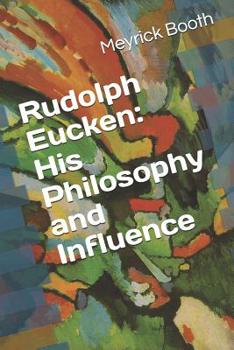Rudolph Eucken: His Philosophy and Influence
The book consists of twelve chapters, the first five being expository in character, while the remainder of the volume seeks to apply the principles of Eucken's philosophy to some of the central problems, social, educational, and religious, of modern life and thought. The book is written in a clear and dignified style throughout, and it will doubtless prove interesting and helpful to many to whom the ponderous works of Eucken himself would prove both difficult and tedious. It is only natural, however, that the characteristic which qualifies the value of Eucken's own books in the mind of the reader who insists upon reducing his philosophy to the recognizable terms and data of every-day and scientific experience, the addiction to the use of large and vague concepts which are nowhere subjected to careful analysis, should reappear in an exposition like the present one, and similarly detract from its value as a contribution to scholarship. Phrases like "the spiritual life," "the spiritual world," "spiritual values," and so on, appenr on almost every page. The contrast between nature and spirit, we are told, runs throughout the whole of Eucken's philosophy. "Is nature (that is, the world of matter seen in the light of science) the true basis of reality, of which spirit, if it be allowed to exist at all, is a by-product? Or is spirit the source and fundament of all reality, nature being ultimately dependent upon an invisible world? This is the great alternative" (pp. xi-xii).But if the whole of a philosophy is to be built around the antithesis of nature and spirit, if its central purpose is to establish the " independent existence" and the "supremacy of the spiritual world," it would seem to be a matter of first-rate importance to undertake a systematic analysis of the concepts in question; but, in spite of repeated attempts on Mr. Booth's part, his success in clearing up the meaning of these phrases is not much greater than attends the efforts of Eucken himself through many labored volumes. The writer has searched the present book in vain (as he has the pages of Eucken's own works) for a single or unambiguous meaning of the term "spiritual life," the existence and independence of which it is held to be the paramount duty of philosophy to establish. The spiritual life seems in places to mean nothing more than the psychical life, whose independent existence is asserted as against theories of materialism and epiphenomenalism; sometimes it seems to stand for the formal or rational character of experience; sometimes for a formative principle, a sort of Kantian transcendental self, which is responsible for the organization which experience presents; elsewhere an unknown psychic medium is invoked to account for the unity of consciousness, since this unity can not be explained by the brain (on the ground that the nerves entering the brain do not run together in a common center ); sometimes it figures as a personal activity, "the very core of human personality," while at other times it appears as a transcendental power or intelligence which is responsible for the telic movements of nature and history, something "closely analogous to the invisible and personally conducted network of communications which directs and unifies an army," an active, creative principle behind the whole universe, an "independent, self-active, purposive, personal life"; occasionally it seems to stand for the realm of values, or again for a moral excellence of character which can be achieved only by a new birth; then again the concept expands so as to include the sciences, "since they are a spiritualization of nature"; and so on, in a bewildering series of transformations. "It is by no means easy," the author confesses, "for those who are not thoroughly familiar with Eucken's thought to form a clear conception of the spiritual life as he understands it...
Format:Paperback
Language:English
ISBN:1077189516
ISBN13:9781077189515
Release Date:January 1
Publisher:Independently Published
Length:236 Pages
Weight:0.71 lbs.
Dimensions:0.5" x 6.0" x 9.0"
Related Subjects
Biographical Biographies Biographies & History Biography & History History PhilosophyCustomer Reviews
0 rating





